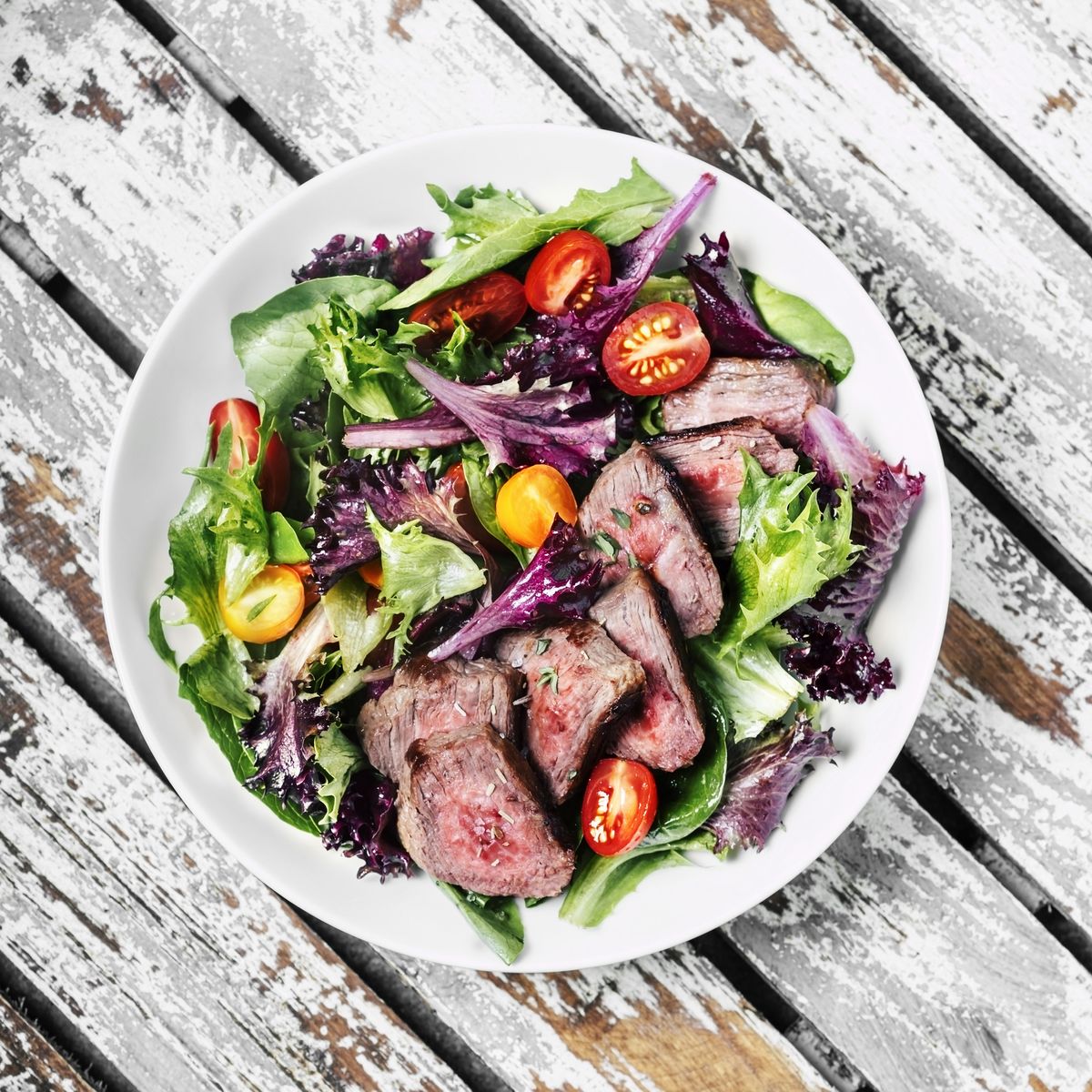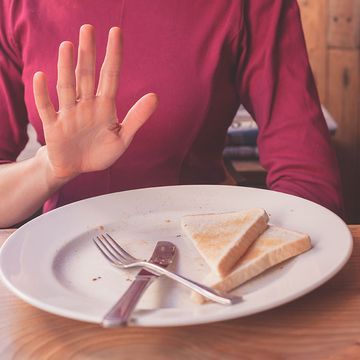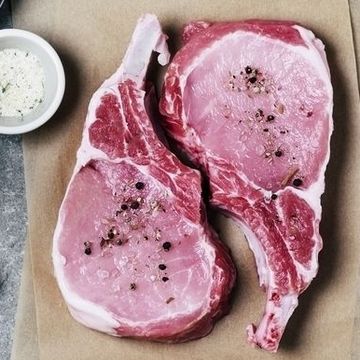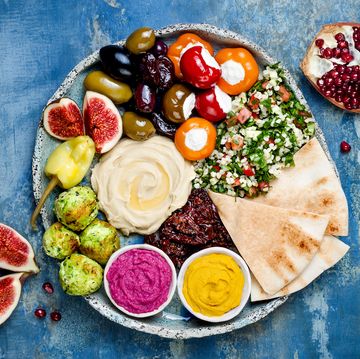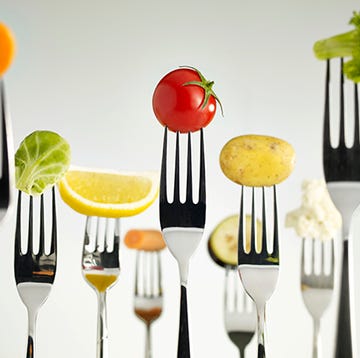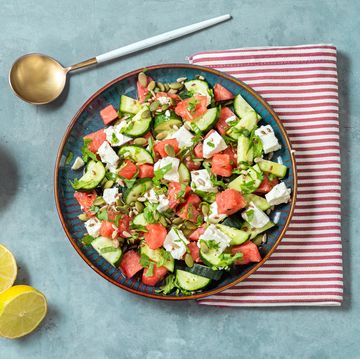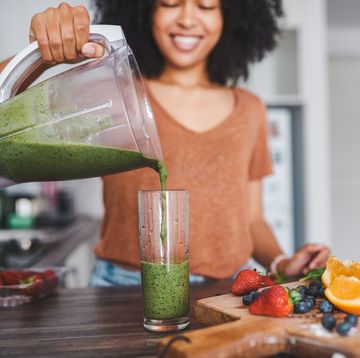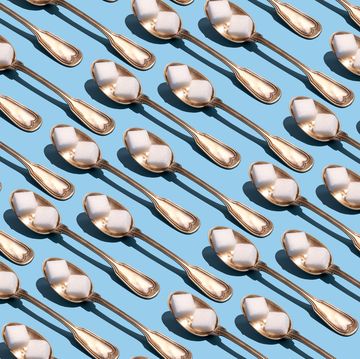In an era of fast dieting and quick weight loss, low-carb diets are having a major moment. If you want to drop pounds stat, proponents of low-carb diets say there's no better and faster way to do it than to limit or completely eliminate carbs.
"Carbs have always been on the chopping block," says Bonnie Taub-Dix, RDN, creator of BetterThanDieting.com, and author of Read It Before You Eat It: Taking You from Label to Table. Protein gets a pass and that's because protein is very satisfying, but the truth is carbs aren't bad. It's the company that carbs keeps."
"There's a big difference between having a slice of whole-grain toast with your eggs in the morning and a croissant with your eggs," Taub-Dix explains. "It's time we change the conversation and start associating carbs with positive things. Carbs are energy giving and provide a wealth of vitamins and fiber, which most of us don't enough of."
Unlike protein and fat, carbs are our body's go-to energy source, so it burns through carbs before it burns through fat. Protein, on the other hand, isn't used for energy and is the building block for muscle repair. So if you lead a very active lifestyle, carbs are essential in your diet.
That said, cutting your carb intake can help you lose weight quickly if you do it right. Here's everything you need to know about low-carb diets for weight loss and their pros and cons. Plus, we break down the most popular types of low-carb diets out there so you can decide which one is best for your lifestyle.
What is a low-carb diet?
A low-carb diet is defined as any eating plan that limits carbohydrates, including those found in grains, starchy vegetables, and fruits. There are many different types of low-carb diets, and each one has their own restrictions on the amount of carbs you can consume daily.
On the keto diet, for instance, only five percent of your daily calories should come from carbohydrates. This is a stark difference from what the U.S. Dietary Guidelines recommend, which is that 45 to 65 percent of your daily calories should come from carbs. On a 2,000-calorie diet, that's around 225 to 325 grams of carbs a day.
🍞 The U.S. Dietary Guidelines state that 45 to 65 percent of your daily calories should come from carbs. 🍞
"What the guidelines say is that we should getting around 50 percent of our calories from carbs, but that doesn't give us the right to overload on them," Taub-Dix says.
Practicing portion control plays a big role in losing and maintaining weight. For example, two cups of pasta can easily equate to five pieces of bread, or one eight-ounce New York bagel can be eight pieces of bread at once. "Whole-wheat pasta is better for you than white pasta, but white pasta in the right portions can make you feel more satisfied," Taub-Dix explains.
Can a low-carb diet help you lose weight?
Low-carb diets work best for short-term weight loss because they restrict you from having simple carbohydrates, like sugar, white pasta, and white bread. These empty calories can add up and lead to weight gain overtime. Instead, low-carb diets encourage you to eat more protein and fat in place of carbs because protein and fat promote satiety and help keep your blood sugar levels stabilized.
By minimizing carbs, low-carb diets, such as the keto diet, will help your body hit ketosis, a state in which your body uses fat for fuel. Naturally, you'll lose more weight if you burn more fat, but the problem with following low-carb diets is that they can be very restrictive and aren't sustainable long-term.
"If I don't have toast with my breakfast, I'm so going to feel like something is missing in my day," says Taux-Dix. "There's an 'ah' factor to eating carbs. It releases serotonin, which makes us feel comforted. It's like getting a hug from your food."
And science agrees: The long-term benefits of low-carb diets for weight loss are very debatable. According to a 2018 study in the European Journal of Nutrition, low-carb, high-fat diets result in weight loss, but long-term adherence to the diet is very difficult and therefore, may cause yo-yo dieting.
The best approach to following a low-carb diet to lose weight is to enjoy carbs in moderation. A 2018 study from BMJ suggests that people who follow a low-carb diet or have a moderate carbohydrate intake burn more calories than those with a high carbohydrate intake. Moreover, ghrelin levels—the hormone that increases appetite—is lower in people who follow a low-carb diet than a high-carb one.
What are the drawbacks of following a low-carb diet?
There are health concerns that following a low-carb diet can encourage unhealthy eating habits, like filling up on foods high in saturated fat and restricting certain vegetables, fruits, legumes, and whole grains from your diet.
A 2018 study from The Lancet suggests that restricting carbohydrates from your diet can increase mortality. The study followed 15,828 adults between the ages of 45 and 64. What researchers found was that people who get 50 to 55 percent of their energy from carbs had the lowest risk of mortality compared to people who consumed 40 percent or less carbs and had a greater mortality risk.
Since low-carb diets encourage you to cut down on carbohydrates as a whole, you're going to be missing starchy veggies, fruit, and whole grains in your diet, which are big sources of health-boosting fiber, vitamins, and antioxidants. Missing these key nutrients in your diet can lead to nutrition deficiencies, inflammation, and disease.
And while filling up on protein has its benefits, research shows that eating too much beef, pork, chicken, and other forms of animal protein has been associated heart problems. According to a 2018 study in Circulation: Heart Failure, following a high-protein diet can increase your risk of heart failure.
In general, restricting carbohydrates from your diet can have long-term negative consequences to your health if you don't have a balanced eating plan that includes a variety of foods.
The most popular low-carb diets for weight loss
The good news about low-carb diets is that there are plenty of options, and not all of them involve counting carbs or sticking to a very small amount. Here's a breakdown of some of the most popular low-carb diets and what to consider before you decide to follow them.
- Keto Diet: The keto diet, aka the ketogenic diet, originally started in the 1920s as a way to help treat epilepsy, but since then it has become one of the most popular low-carb diets for weight loss. On the keto diet, you will limit your carb intake to no more than five percent of your daily calories. This will help your body hit ketosis, a state in which your body uses fat for fuel instead of carbs. While the keto diet has helped thousands of people lose weight, it's highly restrictive, which can be hard to sustain long-term.
- Atkins Diet: Another popular low-carb diet, you might remember Atkins from the early 90s. The Atkins diet is a high-protein, high-fat diet that helps you lose weight by filling up on meat, dairy, and fats, in place of carbs. Atkins has three different plans: Atkins 20, Atkins 40, and Atkins 100. All three plans involve keeping your daily carb intake low. During the first phase of the Atkins 20, for example, you will have only 20 to 25 grams of net carbs daily. As you progress within your plan, you gradually increase the amount of net carbs you can enjoy.
- Whole30: The Whole30 diet is a Paleo-inspired eating plan, where you restrict sugar, alcohol, dairy, grains, gluten, and legumes from your diet for 30 days. The goal of Whole30 isn't necessarily to lose weight but to help you combat your sugar addiction, focus on clean eating, and uncover food sensitivities. However, many people follow Whole30 as a way to detox after the holidays or lose weight before a big event, like a wedding. Because it helps you avoid eating highly processed packaged foods and promotes healthy home cooking, you might lose a significant amount of weight, depending on what your eating habits were like before you started the diet. Why 30? Creators of the diet believe that 30 days is all you need to reset your body and improve you relationship with food.
- Paleo diet: The Paleo diet is another low-carb eating plan that focuses on eating lean protein, vegetables, fruits, and healthy fats. The Paleo diet mimics eating patterns of our Paleolithic ancestors who ate only foods they hunted or gathered for. This means you can eat fruits, vegetables, nuts and seeds, and lean protein, but dairy products, grains, beans and legumes, and highly processed foods, like sugar and artificial sweeteners, are off limits.
The bottom line is that low-carb diets aren't meant to be followed long-term
If you want to follow a low-carb diet to lose weight, be sure to talk to your doctor and a registered dietitian to help you find the right diet for you. As we mentioned, restricting carbs can lead to nutritional deficiencies and yo-yo dieting, so you want to make sure you're still getting a balanced diet that makes you feel satisfied and delivers the nutrients you need.
As Taub-Dix notes, "When it comes to diets, it should be something you could live with forever. A lot of people say they cheated on their diet or I fell off the bandwagon, but a diet you can keep for life shouldn't feel like you got off of something."
Stay updated on the latest science-backed health, fitness, and nutrition news by signing up for the Prevention.com newsletter here. For added fun, follow us on Instagram.
